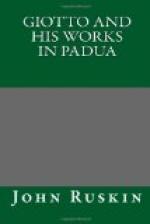Still, even when thus understood, there is much in the anecdote very curious. Here is a painter requested by the head of the Church to execute certain religious paintings, and the only qualification for the task of which he deigns to demonstrate his possession is executive skill. Nothing is said, and nothing appears to be thought, of expression, or invention, or devotional sentiment. Nothing is required but firmness of hand. And here arises the important question: Did Giotto know that this was all that was looked for by his religious patrons? and is there occult satire in the example of his art which he sends them?—or does the founder of sacred painting mean to tell us that he holds his own power to consist merely in firmness of hand, secured by long practice? I cannot satisfy myself on this point: but yet it seems to me that we may safely gather two conclusions from the words of the master, “It is enough, and more than enough.” The first, that Giotto had indeed a profound feeling of the value of precision in all art; and that we may use the full force of his authority to press the truth, of which it is so difficult to persuade the hasty workmen of modern times, that the difference between right and wrong lies within the breadth of a line; and that the most perfect power and genius are shown by the accuracy which disdains error, and the faithfulness which fears it.
And the second conclusion is, that whatever Giotto’s imaginative powers might be, he was proud to be a good workman, and willing to be considered by others only as such. There might lurk, as has been suggested, some satire in the message to the pope, and some consciousness in his own mind of faculties higher than those of draughtsmanship. I cannot tell how far these hidden feelings existed; but the more I see of living artists, and learn of departed ones, the more I am convinced that the highest strength of genius is generally marked by strange unconsciousness of its own modes of operation, and often by no small scorn of the best results of its exertion. The inferior mind intently watches its own processes, and dearly values its own produce; the master-mind is intent on other things than itself, and cares little for the fruits of a toil which it is apt to undertake rather as a law of life than a means of immortality. It will sing at a feast, or retouch an old play, or paint a dark wall, for its daily bread, anxious only to be honest in its fulfilment of its pledges or its duty, and careless that future ages will rank it among the gods.
I think it unnecessary to repeat here any other of the anecdotes commonly related of Giotto, as, separately taken, they are quite valueless. Yet much may be gathered from their general tone. It is remarkable that they are, almost without exception, records of good-humoured jests, involving or illustrating some point of practical good sense; and by comparing this general colour of the reputation of Giotto with




